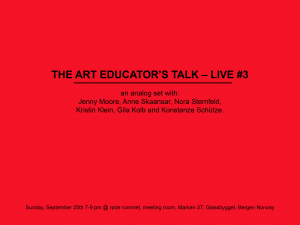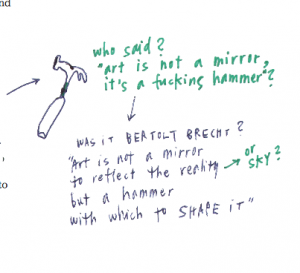 The Art Educator’s Talk LIVE #3 (analog set)
The Art Educator’s Talk LIVE #3 (analog set)
time: Sunday, September 25th 7-9 pm
location: røde rommet, meeting room, Marken 37, Glassbygget, Bergen, Norway
guests/hosts/speakers: Jenny Moore, Anne Skaansar, Nora Sternfeld
organized by/in conversation with: Kristin Klein, Gila Kolb, Konstanze Schütze & agency art education
What is your understanding of art education? What is the relationship between education and art? Why educate people about (contemporary) art? If you imagine the future, what is it going to be for art education? What are you currently working on?
These are only a few questions we’d like to discuss with Anne Skaansar (KHIB Bergen), Nora Sternfeld (Aalto University, forethought), Jenny Moore (the Partisan café), Konstanze Schütze (agency art education, store contemporary/Berlin & Dresden), Kristin Klein (University of Cologne) and Gila Kolb (The Art Educator’s Talk, University of Cologne).
The Art Educator’s Talk is a trilingual blog and a series of talks that reaches out to art educators who are looking for inspiration or exchange, like-minded people, students who want to learn about the profession, academics, artists and curators who want to know more about art education and you. We engage in conversations with art educators about their practice, favorite formats, pressing questions, underlying or developing theories and visions for a future art education. You can find interviews with other professionals of the field online here: https://arteducatorstalk.net/en/about/
Continue reading
